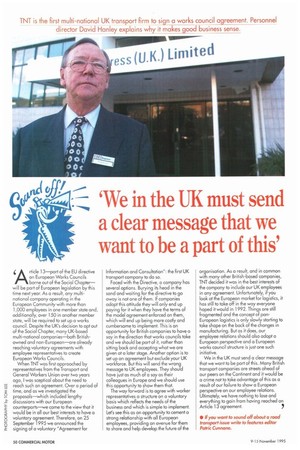'We in the UK must send a clear message that we want to be a part of this'
Page 62

If you've noticed an error in this article please click here to report it so we can fix it.
TNT is the first multi-national UK transport firm to sign a works council agreement. Personnel director David Hanley explains why it makes good business sense.
i rticle 13—part of the EU directive on European Works Councils
borne out of the Social Chapter— will be part of European legislation by this time next year. As a result, any multinational company operating in the European Community with more than 1,000 employees in one member state and, additionally, over 150 in another member state, will be required to set up a works council. Despite the UK's decision to opt out of the Social Chapter, many UK-based multi-national companies—both Britishowned and non-European—are already reaching voluntary agreements with employee representatives to create European Works Councils. When TNT was first approached by representatives from the Transport and General Workers Union over two years ago, I was sceptical about the need to reach such an agreement. Over a period of time, and as we investigated the proposals—which included lengthy discussions with our European counterparts—we came to the view that it would be in all our best interests to have a voluntary agreement. Therefore, on 25 September 1995 we announced the signing of a voluntary "Agreement for
Information and Consultation": the first UK transport company to do so. Faced with the Directive, a company has several options. Burying its head in the sand and waiting for the directive to go away is not one of them. if companies adopt this attitude they will only end up paying for it when they have the terms of the model agreement enforced on them, which will end up being more costly and cumbersome to implement. This is an opportunity for British companies to have a say in the direction that works councils take and we should be part of it, rather than sitting back and accepting what we are given at a later stage. Another option is to set up an agreement but exclude your UK workforce. But this will send the wrong message to UK employees. They should have just as much of a say as their colleagues in Europe and we should use this opportunity to show them that. The way forward is to agree with worker representatives a structure on a voluntary basis which reflects the needs of the business and which is simple to implement. Let's see this as an opportunity to cement a strong relationship, with all European employees, providing an avenue for them to share and help develop the future of the organisation. As a result, and in common with many other British-based companies, TNT decided it was in the best interests of the company to include our UK employees in any agreement. Unfortunately, if you look at the European market for logistics, it has still to take off in the way everyone hoped it would in 1992. Things are still fragmented and the concept of panEuropean logistics is only slowly starting to take shape on the back of the changes in manufacturing. But as it does, our employee relations should also adopt a European perspective and a European works council structure is just one such initiative.
We in the UK must send a clear message that we want to be part of this. Many British transport companies are streets ahead of our peers on the Continent and it would be a crime not to take advantage of this as a result of our failure to show a European perspective on our employee relations. Ultimately, we have nothing to lose and everything to gain from having reached an Article 13 agreement.
• If you want to sound off about a road transport issue write to features editor Patric Cunnane.




















































































































